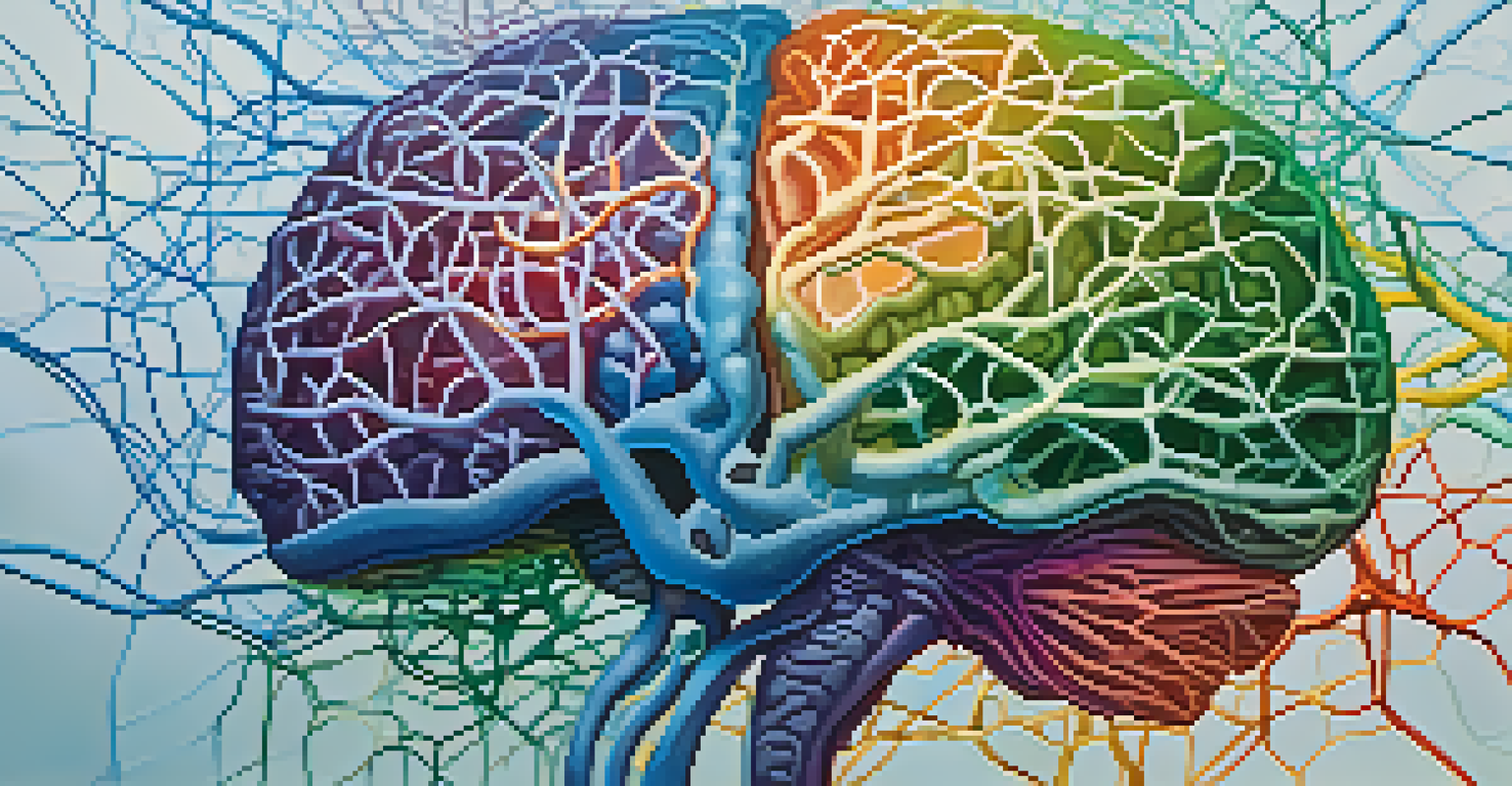Psychedelics: Potential Benefits for Immune Disorders

Understanding Psychedelics and Their Effects
Psychedelics are substances that alter perception, mood, and cognitive processes. Common examples include LSD, psilocybin (found in magic mushrooms), and ayahuasca. While often associated with recreational use, recent research suggests these compounds could have therapeutic benefits, particularly in mental health and potentially immune function.
Psychedelics can reveal to us the deeper connections between our mind and body, highlighting the profound impact of mental health on our physical well-being.
The effects of psychedelics are typically profound and can lead to altered states of consciousness. This alteration can facilitate deep introspection and emotional breakthroughs, which some researchers believe may influence physical health, including immune responses. By engaging the brain's serotonin receptors, psychedelics might create pathways for healing.
Understanding how psychedelics work can help demystify their potential. For example, studies have shown that they can promote neuroplasticity, or the brain's ability to adapt and reorganize itself. This adaptability could extend to immune system modulation, making psychedelics a fascinating area of research.
The Immune System: A Brief Overview
The immune system is the body's defense mechanism against infections and diseases. It comprises various cells, tissues, and organs that work together to identify and eliminate pathogens. An effective immune response is crucial for maintaining overall health, but it can sometimes become imbalanced, leading to disorders.

Immune disorders can take many forms, from allergies to autoimmune diseases, where the body mistakenly attacks its own cells. These conditions can significantly impact quality of life and often require ongoing management. Understanding the complexities of the immune system is essential for exploring new treatment avenues.
Psychedelics May Boost Immune Health
Research suggests that psychedelics could have immunomodulatory effects, potentially enhancing immune function and overall health.
Research into immune disorders has traditionally focused on pharmaceuticals and lifestyle changes. However, there is a growing interest in alternative therapies, including psychedelics, as potential adjuncts to conventional treatments. This exploration could open doors to innovative strategies for managing immune health.
Psychedelics and the Immune System: What We Know
Emerging studies suggest that psychedelics may have immunomodulatory effects, meaning they could help regulate the immune response. For instance, some animal studies have indicated that psychedelics can enhance immune function, potentially providing a boost when the body needs it most. However, human studies are still in their infancy.
The future of medicine may not just be about treating the symptoms of illness but exploring the psychological and emotional landscapes that contribute to our overall health.
One theory is that the psychological benefits of psychedelics, such as reducing anxiety and depression, may indirectly improve immune function. When individuals feel mentally well, their bodies may respond better to stressors, including illness. This connection between mental and physical health is becoming increasingly recognized in the medical community.
While the results are promising, it’s essential to approach these findings with caution. Research is ongoing, and the exact mechanisms through which psychedelics may affect the immune system are not yet fully understood. Therefore, continued investigation is crucial to validate these initial observations.
Case Studies: Psychedelics in Action
Several anecdotal reports and small-scale studies have highlighted positive outcomes from psychedelic use in individuals with immune disorders. For example, some patients with chronic pain and autoimmune conditions have reported significant symptom relief after psychedelic experiences. These accounts spark interest in the broader implications of psychedelics for immune health.
In one study, participants with treatment-resistant depression saw improvements in their mental health after psilocybin therapy, which coincided with reports of better physical health. While these findings are not definitive, they suggest a potential link between mental and immune health that warrants further exploration.
Mental Health and Immune Connection
The psychological benefits of psychedelics, such as reduced anxiety and depression, may indirectly improve immune responses.
Such case studies provide valuable insights into how psychedelics might help manage immune disorders. They illustrate the importance of a holistic approach to health, considering both mental and physical well-being. As research progresses, more structured studies are needed to build on these early observations.
Potential Risks and Considerations
Despite the potential benefits, using psychedelics is not without risks. These substances can lead to challenging psychological experiences, commonly referred to as 'bad trips.' For individuals with certain mental health conditions, the use of psychedelics may exacerbate symptoms rather than alleviate them.
Additionally, the legal status of psychedelics varies widely across regions, which can complicate access to treatment. It’s crucial for individuals considering psychedelics to consult with healthcare professionals and ensure they are in a safe and supportive environment. This precaution can help mitigate risks and enhance the therapeutic experience.
As research progresses, understanding the balance between potential benefits and risks will be vital. Ongoing studies will need to establish clear guidelines for safe use, ensuring that individuals can explore these promising avenues without compromising their health.
The Future of Psychedelics in Healthcare
The future of psychedelics in healthcare looks promising, particularly for immune disorders. As more research emerges, we may see a shift in how these substances are perceived within the medical community. This transformation could lead to new treatment protocols integrating psychedelics as part of holistic care.
Innovations in psychedelic therapy, such as guided sessions with trained professionals, are being developed to enhance safety and efficacy. These therapeutic models may offer patients a structured approach to exploring psychedelics for their health concerns, including immune-related issues. The potential for personalized treatment plans is exciting.
Risks and Future of Psychedelics
While promising, the use of psychedelics carries risks that necessitate careful consideration and ongoing research to ensure safe application in healthcare.
Ultimately, the incorporation of psychedelics into mainstream healthcare could revolutionize how we approach immune disorders. By combining traditional methods with innovative therapies, we can foster a more comprehensive understanding of health and well-being.
Conclusion: A New Frontier in Immune Health
The exploration of psychedelics for immune disorders represents a new frontier in health research. While the potential benefits are still being studied, the intersection of mental and physical health is gaining recognition. This realization could lead to more effective treatment strategies for individuals facing immune challenges.
As we continue to uncover the complexities of the immune system and the effects of psychedelics, it’s essential to keep an open mind. Collaboration between researchers, healthcare providers, and patients will be key to advancing our understanding of these substances. Together, they can pave the way for innovative approaches to health.

In conclusion, while much remains to be learned, the potential for psychedelics to contribute to immune health is an exciting prospect. With ongoing research and dialogue, we may soon find ourselves at the forefront of a new era in healthcare.